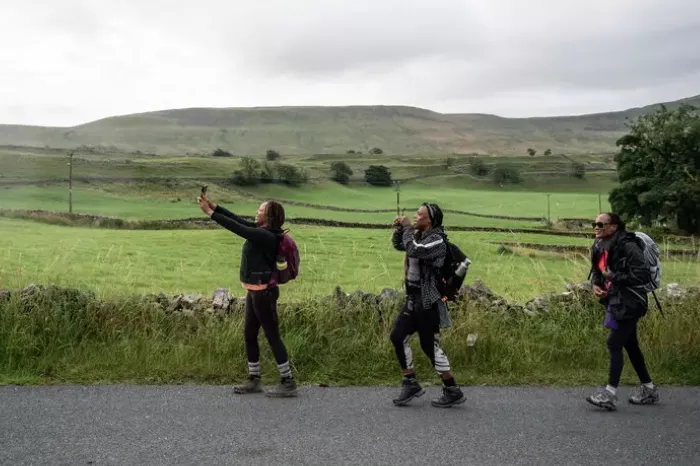Motivated by a perceived racial disparity among hikers in Britain, Rhiane Fatinikun founded Black Girls Hike, aiming to make the country’s natural spaces more inclusive.
On a recent summer morning, 15 women climbed the narrow stone steps of the Yorkshire Dales, their sights set on a mist-covered peak. The group, which had gathered to tackle three summits that day, reflected a vibrant community of Black women seeking adventure in the English countryside.
Rhiane Fatinikun, who organized this trek, offered words of encouragement from the back of the line. In 2019, she founded Black Girls Hike after noticing the lack of representation of Black individuals in outdoor activities. Her mission is to challenge the notion that outdoor pursuits in Britain are primarily for the white middle and upper classes.
“Sometimes it’s actually quite sad, because you realize how people are going through life and just not being seen,” said Fatinikun, 37. “But I am glad that they feel like they can be whoever they want to be here.”
Since its inception, Black Girls Hike has grown into a nationwide organization, welcoming hundreds of Black women eager to explore nature through weekend getaways and shorter hikes. Research indicates that people from minority racial and ethnic backgrounds in Britain often live in urban areas, further away from green spaces.
Corinne Fowler, a professor of colonialism and heritage at the University of Leicester, noted that Britain’s countryside has long been associated with whiteness, creating feelings of exclusion for individuals from diverse backgrounds. “People are very quick to dismiss the suggestion that there is racism in the countryside,” she stated, underscoring the importance of inclusivity in natural spaces.
Fatinikun, hailing from the Manchester area near several national parks, did not initially see herself as an “outdoorsy” person. This changed during a train journey through the Peak District in 2019, when she decided to take up hiking. However, she quickly realized the lack of representation as she began to explore.
What started as small local hikes organized through social media soon expanded across the country. “It just snowballed really quickly,” she recounted. Fatinikun has since led numerous hiking trips both within Britain and internationally, including in Ghana, Morocco, and Norway.
The COVID-19 pandemic brought a surge of interest in hiking, as many sought ways to improve their mental health and connect with nature. As a result, Fatinikun left her local government job to focus entirely on Black Girls Hike.
Initially faced with challenges, she educated herself on navigating topographical maps and acquiring suitable outdoor gear. While the broader hiking community has largely embraced her efforts, she has also encountered racist backlash, particularly on social media after appearing on the BBC program “Countryfile.”
“At the beginning, you would take it really personally,” she reflected. “I just do not even engage with that now. We need to focus on the people that do support us.”
For Fatinikun, her passion for the outdoors is rooted not in conquest but in appreciating its restorative qualities. Through Black Girls Hike, she has fostered connections that transcend mere hiking, with intergenerational friendships forming among participants.
This year, her contributions were recognized with a royal honor — Member of the Order of the British Empire (M.B.E.) — for her outstanding service to the community. Additionally, she recently published “Finding Your Feet,” a guide to hiking and adventure.
The evening before their hike in the Yorkshire Dales, participants arrived from various parts of England at a bunkhouse near the first peak. Ranging in age from their 20s to 60s, many women were meeting for the first time.
“All my friends are Black women, and they don’t all like hiking,” said Natalie Hurst-Knight, 33, from southwest London. “But this is great — it feels like you are in a welcoming space.”
Pauline Pennant, 55, who joined after the pandemic, echoed similar sentiments: “We are all at different stages in life. You get to have this experience together.”
As they prepared for the hike, the group received guidance from local experts about weather conditions and safety. “There is no pressure — this is about finding your personal best,” Fatinikun encouraged before they set out.
Throughout the challenging climb, Fatinikun’s supportive demeanor resonated with the group. “I love it, and they love it,” she said, reflecting on the experience. “And it’s really good for them to come out of their comfort zones. Just last week, one girl told me, ‘I feel like I can do anything now.’”
Related topics:
- Pennsylvania State Police Officer Fatally Stabbed on Hiking Trail
- The Greatest World Championship Road Race: A Look Back at Lemond’s 1989 Triumph
- Boatsetter Launches ‘Explorer’ Collection for Expanded Water Experiences

